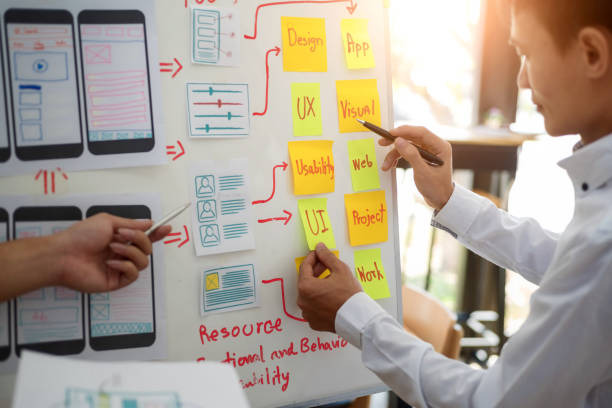In the contemporary digitization landscape, application developers are always at the forefront of the future. As more and more businesses and organizations seek to establish their presence digitally through applications, the demand for application developers is at its peak.
So many people may wonder, “how to become an application developer?” This guide provides a comprehensive roadmap to embarking on a journey toward becoming an application developer. Let’s stay tuned to get more details!
Who Is An Application Developer?
An application developer is a professional responsible for designing, creating, testing, and maintaining software applications for various platforms, such as:
- Desktop computers
- Mobile devices
- Web browsers
- Other digital platforms
These developers are integral parts of the software development process. They are instrumental in turning ideas and concepts into functional and user-friendly applications.

Application devs can specialize in different platforms and programming languages, such as:
- Web Application: HTML & CSS, and JavaScript
- Mobile App: Swift for iOS and Java/Kotlin for Android
- Desktop App: Java, C#, or C++.
- Full-stack: Front-and-back-end development
Overview of Application Development
App development involves creating, testing, and programming applications or software programs. These applications can reside on desktops, laptops, and mobile devices or be cloud-based.
This process involves multiple steps, from the initial conceptualization and design to the maintenance stage post-launch. Here’s a general rundown:
1. Planning and Analysis
In this stage, the team determines goals and considers end-users needs, technical requirements, budgets, and deadlines.
2. Design
The design stage formulates the application’s appearance and user interface. It involves creating storyboards and visual representations of the application’s functionalities.
3. Development
Developers use programming languages suitable for the application type and platform to write the actual code for the application.
4. Testing
After developing the application, the team tests it to uncover potential bugs or issues. They then fix these issues to ensure functionality, usability, and security.
5. Deployment
The team distributes the application via an appropriate platform, such as:
- Google Play Store for Android apps
- App Store for iOS
- Directly via the Internet for web apps
6. Maintenance and Updates
Post-launch, the application requires regular maintenance and updates to keep up with user feedback, address bugs, adapt to hardware/software compatibility changes, or add new features.
How to Become an Application Developer
Becoming an application developer requires education, technical skills, and experience. The following steps can help you understand more about becoming an app developer:

1. Choosing a Specialization
In the grand scheme of application development, the choices available to any aspiring professional are copious.
Developers can choose mobile to web-based applications and full-scale software development. However, each path holds unique opportunities and challenges.
The industry also offers room for a focused approach, with the chance to specialize in specific sectors such as:
- Healthcare
- Education
- Finance
- Gaming and others
Choosing a specialization is not just about your inclination. Still, it should be a judicious blend of your interests, skills, and current market trends.
To formulate a strategic career plan, you must fully understand each specialization. Dabble in different areas, test out multiple platforms, and develop a clear understanding of the fundamental dynamics involved in each sector.
Having a clear strategic direction will not only give you a sense of purpose. Still, it will also prepare you to meet specific industry requirements.
2. Mastering Programming Languages & Technologies

Coding ability is one of the irrefutable requirements in app development. You need to know the importance of gaining familiarity with programming languages.
- Python
- Java
- JavaScript
- Swift, or C#
- And more
These languages have attributes chosen based on the requirements of a particular app development project. Besides mastery over these languages, understand the working of Integrated Development Environments (IDEs) and version control systems.
Moreover, having a working knowledge of essential libraries and frameworks (Django, React, Angular, and Vue.js) can tremendously enhance your app development process.
All these components can transform your programming skills from basic to awe-inspiring when appropriately harnessed.
3. Building a Strong Portfolio
Experience and expertise in the tech industry are often validated through practical showcases rather than mere degrees or certifications.
A portfolio can exhibit your command over coding, problem-solving skills, and your knack for project management. It paints a well-rounded picture of your abilities. It also sets you apart from other aspiring developers.
You can leverage platforms like GitHub to display your independent projects. Whether you have contributed to open-source projects or executed freelancing gigs, these experiences reflect your ability to handle real-world problems.
All these pieces represent the magnitude of your expertise and skills, making you an appealing candidate in the competitive app development industry.
4. Gaining Practical Experience

While educational institutions provide the theoretical knowledge required in the app development arena, nothing beats the hands-on, practical experience.
Combining your academic knowledge with hands-on exposure through internships, freelance projects, or app development provides an understanding of the industry dynamics.
Experiential learning sharpens your skills and allows you to navigate through complicated processes, deal with challenges, and devise practical solutions.
The more you engage in practice, the more comfortable you become with creating and troubleshooting apps, thus amplifying your abilities.
5. Networking and Professional Development
Once developers have specific experience, they need to network with their surroundings. Staying actively engaged within the tech community helps them:
- Absorb new knowledge
- Become aware of the latest industry practices
- Provide platforms for sharing ideas and experiences
Moreover, networking provides numerous opportunities for collaboration and forming strategic alliances. It often paves the way for potential job prospects.
6. Creating a Strong Online Presence
In today’s digitized era, your online presence speaks volumes about your knowledge, experiences, and capabilities.
Such following activities can contribute to creating a robust online footprint.
- Regularly updating your LinkedIn profile
- Actively engaging with programming communities online
- Running a tech blog
- Having a website where you share your experiences.
They increase your visibility within the tech community, letting you access valuable feedback, learning resources, and collaboration opportunities.
A persuasive online presence often leads to unexpected opportunities, pushing your career projection upwards in app development.
7. Preparing for Interviews

Job interviews for application developers are a different game altogether. They test real-time problem-solving skills mainly through coding tests.
As an aspiring app developer, you must practice coding problems regularly, and stay updated with new and emerging trends in app development.
Interviewers are looking to assess theoretical knowledge and are keen on understanding your approach to problem-solving, adaptability, and ability to work under challenging parameters.
Hence, interview preparation should be comprehensive, ensuring you can handle any curveballs.
8. Landing Your First Job
The fruit of all your labor, diligence, and unwavering commitment is finally visible when you land your first job as an Application Developer. Landing your first job is a milestone, bringing about a sense of joy and accomplishment.
The new role allows you to apply everything you’ve learned so far and simultaneously, exposes you to new experiences and opportunities for learning.
Remember, every job may not perfectly fit your image of an ideal role. The key is approaching a career’s early stages with an open mind.
Each experience, no matter how challenging, brings essential lessons that can help you refine your skills and push you toward your ultimate career aspirations.
9. Continuing Professional Growth

With the rapid evolution of technology, developers need continuous learning. They must constantly do the following:
- Find ways to expand their knowledge base
- Discover new programming languages
- Familiarize with the latest tools and trends in application development
- Attend technical workshops, or enroll for professional certifications.
- Make it a habit to read industry-related publications, or tech blogs.
- Experiment with new methodologies and explore new technologies.
These practices ensure you retain your competitive edge in the ever-evolving app development world.
Job Responsibilities
As an application developer, you will have several key responsibilities:
- Meeting with clients to define a project’s conceptual software requirements and scope.
- Writing code using programming languages to build the functionality and features of the application.
- Conducting testing to identify and fix bugs and other issues, providing the software works as intended.
- Working in a team with other developers, designers, and stakeholders, collaborating to complete the project.
- Integrating the application with databases, APIs (Application Programming Interfaces), and other software systems.
- Providing updates, improvements, and bug fixes to ensure its ongoing functionality and security.
- Specializing in platforms like Android, iOS, Windows, or web applications.
- Using version control tools, like Git, to keep track of code modifications and record their work for future use.
Career Requirements
Becoming an application developer requires technical skills, educational background, and personal qualities. Here are some standard requirements to pursue a career as an application developer:
- A bachelor’s degree in computer science, software engineering, or a similar discipline
- Understanding of computer programming concepts and principles
- Proficiency in programming languages commonly used for application development
- Knowledge of software development methodologies (e.g., Agile, Scrum) and version control systems (e.g., Git)
- Ability to design, develop, and debug software applications
- Familiarity with front-end and back-end development
- Experience with mobile app development frameworks for building cross-platform applications
- Understanding of database design and management (e.g., SQL, NoSQL)
- Knowledge of data modeling and data structures
- Proficiency in handling data securely and efficiently within applications
- Familiarity with software architecture patterns (e.g., MVC, MVVM)
- Ability to design scalable and maintainable application architectures
- Awareness of microservices and APIs
- Strong problem-solving skills to troubleshoot and resolve software issues
- Analytical mindset for efficiently breaking down complex problems into manageable components
- Eagerness to stay updated with the latest trends, tools, and technologies in application development
- Willingness to learn and adapt to changing industry demands
- Practical communication skills for collaborating with team members, stakeholders, and clients
- Ability to work in a team environment and contribute to the development process
- Creativity in designing user interfaces and experiences
- A focus on creating applications intuitive and user-friendly
- Building a portfolio showcasing personal projects and applications developed
Learning Tips
Becoming an application developer requires technical skills, creativity, and perseverance. Here are some tips to help you on your journey:
- Master programming languages like Java, Python, Swift, or Kotlin.
- Understand the syntax, data structures, and object-oriented concepts.
- Choose a platform (Android or iOS) and learn the respective development environment (Android Studio or Xcode).
- Study platform-specific languages and frameworks (e.g., Android SDK, iOS SDK, SwiftUI).
- Take advantage of online tutorials and courses to gain in-depth knowledge.
- Platforms like Udemy, Coursera, and YouTube offer excellent resources for app development.
- Start creating simple apps to apply what you’ve learned.
- Gradually progress to more complex projects as your skills improve.
- Join developer communities and forums to collaborate with peers.
- Participate in code reviews and seek feedback to enhance your coding practices.
- Follow the most recent developments in mobile app development.
- Practice coding regularly to reinforce your skills and develop problem-solving abilities.
FAQs
How many developers do you need for an app?
You need a team of 2-3 developers for a small app project. Medium-sized projects may have a team of 4-10 developers, including additional roles like quality assurance testers, database administrators, and project managers.
How long does it take to become an application dev?
The time to become an application developer varies depending on experience, education, and dedication. It can take a couple of months or many years.
How do I become an app developer with no experience?
For those aspiring to be an app developer without prior experience, you’ll need to do the following:
- Acquaint yourself with coding
- Establish a professional network
- Compile a portfolio of your work
- Participate in pertinent projects
- Seek out internships or foundational, entry-level roles
Conclusion
Becoming an application developer in the fast-paced digital world requires a mix of education, technical skills, and practical experience.
This guide has highlighted essential steps to embark on this journey, such as choosing a specialization, mastering programming languages, building a solid portfolio, gaining experience, networking, and establishing an online presence.
Thank you for reading!
